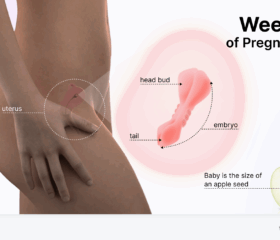What Are the Side Effects of Prenatal Vitamins?
Whether you’re already pregnant or are still trying to conceive, it’s impossible to overstate the importance of prenatal vitamins.

It’s very important to take your doctor-prescribed prenatals so that you have the best shot possible at having a successful pregnancy and a healthy baby.
Unfortunately, many women claim to suffer from side effects from their prenatal vitamins. These can be tricky to tell from regular pregnancy symptoms.
Read on to learn what side effects are common with prenatal vitamins, what causes them, and how you can manage them.
What are the most common side effects of prenatal vitamins?
Prenatal vitamins are safe to take (and, in fact, doing so as ordered by your doctor is essential). However, they can cause certain gastrointestinal issues, like nausea, gas, and constipation.
Again, it can be tough to tell whether these symptoms are actually the result of taking prenatal vitamins or whether they’re just pregnancy symptoms. For instance, morning sickness (nausea) is one of the most common and infamous signs of pregnancy, especially in the first trimester. 1
If you feel queasy shortly after taking your prenatal vitamin, the pill is probably the culprit. On the other hand, if your nausea or other digestive woes persist throughout the day, your pregnancy itself is probably to blame.
Why can prenatal vitamins cause gastrointestinal issues?
The high iron content in prenatal vitamins may be to blame for the nausea they sometimes cause.
Iron helps your body produce extra red blood cells that deliver oxygen to your baby. 2 However, while it’s important for pregnancy, iron can be tough on the stomach and can slow down your digestive tract. 3
What other side effects do prenatal vitamins have?
Outside of digestive issues, actually taking the prenatal vitamin itself can be uncomfortable. Many vitamins are quite large, and as a result, they can be difficult to swallow and may trigger your gag reflex, especially if you’re already feeling nauseous.
The high iron content of the pills can also leave a strange, metallic aftertaste in your mouth for a while after you take one.
Allergic reactions
While this is much less common, some women also report more serious side effects, which could indicate an allergic reaction. Watch out for: 1
- Skin itchiness or dryness
- Breathing difficulties
- Hives
If you have any of these symptoms, call your doctor right away. 4
Why you need prenatal vitamins (despite the side effects)
Though reading through the list of side effects above may leave you feeling apprehensive, prenatal vitamins are essential for a healthy and safe pregnancy. In particular, you need to take your prenatals to ensure you get enough folic acid and iron.
You can get a lot of other vitamins from your diet (if you have a good diet, at any rate), but it can be hard to get enough iron and folic acid—which happen to be the two most important nutrients for pregnancy.
It’s been proven that folic acid helps prevent babies from developing neural tube defects (a type of birth defect). It will also support your baby’s growth and the health of your placenta. 2
Taking a prenatal vitamin may ensure you get enough vitamin D, calcium, and iodine, which your regular pregnancy diet may lack. It may also help you get enough DHA (an omega-3 fatty acid), although this isn’t present in all prenatal vitamins, so you’ll have to check the label to be sure.
Talk to your doctor about taking prenatal vitamins during the postpartum period
It’s well-established that you should take prenatal vitamins before and during pregnancy. Many women also continue taking them after giving birth, as breastfeeding demands a lot of nutrients. That said, your prenatal vitamin might not have everything that you need to breastfeed, so you’re best off speaking to your doctor to make sure you have the right supplements. 5
Why you shouldn’t take too many supplements
Considering all the benefits prenatal vitamins offer, you may want to add extra supplements into the mix to give you and your little one as many nutrients as possible. However, when it comes to certain vitamins, there can be too much of a good thing.
For instance, excessive vitamin A can be particularly dangerous during pregnancy. While some is necessary, high doses can actually harm your baby. 6
Always take the doses stated on your prenatal vitamin’s packaging, and don’t add any extra supplements to your diet without speaking to your doctor. Note that prenatal vitamins can also interact with other prescription and over-the-counter medications, so if you’re regularly taking any medicine, run that by your doctor, too. 7
How to manage and prevent prenatal vitamin side effects
While prenatal vitamins can bring about unwelcome side effects, the benefits for you and your baby far outweigh the temporary discomforts.
Rather than cutting out prenatal vitamins, you can make a few simple adjustments to ease your side effects. For instance, if you’re struggling with nausea, one simple and effective change you can make is to avoid taking your pill on an empty stomach. Eat a small meal or snack just beforehand to create a buffer.
To curb your digestive woes, you can also try:
- Switching to bedtime: Take your pill right before going to sleep, as this means you’ll be asleep during the peak period for potential nausea.
- Drinking plenty of water: Wash down the pill with lots of water so it dissolves more easily. This will also make it easier to swallow, as well as combat constipation.
- Using vitamin B6: Vitamin B6 can ease the symptoms of nausea. In fact, many doctors recommend it as a treatment for morning sickness. 8
- Sticking to a routine: You may also be able to combat nausea by taking your prenatal vitamins at the same time each day, such as with your lunch. This lets your body settle into the routine. Set reminders on your phone or use a similar feature in one of those pregnancy tracker apps to remind you.
- Exercising moderately: Stimulating your digestive system is one of the many benefits of prenatal yoga, walking, swimming, and doing other pregnancy-approved workouts. However, avoid overly strenuous exercise, whether you’re already pregnant or still trying to conceive.
Always chat with your doctor before making any changes to your prenatal vitamin routine.
What if you’re struggling to swallow the pill?
As mentioned, many women find that taking prenatal vitamins can be a chore in itself. If you struggle swallowing the pill, know that prenatal vitamins come in all shapes and sizes.
You could try looking for smaller pills from different brands. Some prenatal vitamins are even split into two smaller, more manageable doses.
You also aren’t just limited to pills—you can look into chewable tablets, powders that mix into drinks, and even liquid prenatal vitamins. (You can also buy vitamins in gummy form, but these don’t usually contain iron, which is a downside.)
Chat with your doctor about the best prenatal vitamins on the market, to find a brand that’s easy for you to take but still full of all the essential nutrients.
When you should talk to your doctor
Most side effects of prenatal vitamins are minor, and you can manage them at home. That said, keep your doctor in the loop and consult with them before switching vitamins or adding any new supplements.
You should also reach out to your doctor if:
- Your side effects are severe or aren’t improving with simple remedies
- You’re consistently unable to keep your prenatal vitamins down due to nausea and vomiting
- You show signs of an allergic reaction, such as hives, a rash, or swelling 1
You should also let your doctor know if you have a pre-existing condition, such as a history of gastric bypass surgery or an eating disorder. In these cases, your nutritional needs might be different, and your doctor may have to draw up a more personalized supplement plan for you.
Final thoughts
Prenatal vitamins aren’t without side effects, but they help ensure that your pregnancy progresses as smoothly as possible. If you’re struggling, hopefully, a few simple adjustments will be all it takes to clear up any vitamin-related nausea or digestive issues.
If your symptoms don’t ease up, your doctor is always on hand to support you.
Article Sources
- MedlinePlus. "Prenatal Vitamins" Retrieved July 9, 2025.
- Cleveland Clinic. "Prenatal Vitamins" Retrieved July 9, 2025.
- Healthline. "Side Effects of Prenatal Vitamins: What They Are and How to Treat Them" Retrieved July 9, 2025.
- St. Luke’s. "prenatal multivitamins" Retrieved July 9, 2025.
- American Pregnancy Association. "Postnatal Vitamins While Breastfeeding" Retrieved July 9, 2025.
- Mayo Clinic. "Prenatal vitamins: Why they matter, how to choose" Retrieved July 9, 2025.
- Texas Children’s. "Prenatal Vitamins and Pregnancy: Here’s what you need to know" Retrieved July 9, 2025.
- Mount Sinai. "Morning sickness" Retrieved July 9, 2025.







